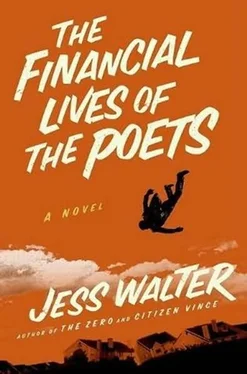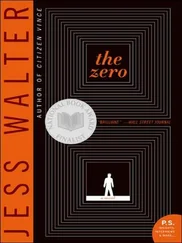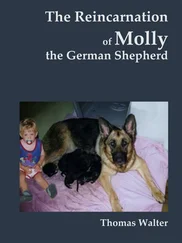“Cool,” he says. “Just come by Larry’s and get me, yo.”
“Okay. About an hour?”
“Yeah, yeah. I’ll just be chillin’.” And then Jamie laughs. “Oh, man, Chulo just bit it. He’s totally fried, yo.”
“Isn’t Chulo always fried?” I ask, even though I’ve yet to figure out which one is Chulo.
Jamie laughs. “No shit, huh?”
I hang up and go back into the kitchen. Dad and the boys are
at the table, eating quietly. I slide back into my chair. Here we are. Three generations of doomed Prior men.
Teddy resumes his consumer-spending report: “Tommy Parnell? He’s got two Wiis.”
“Two? No way!” Franklin says. “What’s he do with two?”
“One at his mom’s house and one at his dad’s house.”
“No way!” Franklin says again.
I could buy five Wiis with the money I spent on treated lumber. Thirty-five with the money I spent on dope. Maybe I can tell Randy and Reese it was all a mistake. I wanted to buy Wiis, not weed.
World teeters. “Look, guys, I gotta go somewhere after dinner. You stay here with Grandpa. Let Mom rest unless it’s something important. Okay?”
“Can we watch a movie?”
“Get your pajamas on first, and don’t forget-”
“What happened to me?”
Teddy, Franklin and I all look up, across the table at Dad.
“What’s that, Dad?”
His eyes narrow. “Why am I here?” He pats his empty pocket for cigarettes.
Veins pop in his forehead. His eyes drill into me. This happens sometimes; all of a sudden Dad will come in sharp, like a distant radio station dialed in on a clear night.
“You just got into some trouble, Dad. It’s gonna be fine. Don’t worry.”
I used to get excited by these occasional glimpses, used to think it meant that my Dad was back, and I’d hurriedly brief him on everything that had happened while he was away-as if he’d been in a coma-or I’d try to get information out of him-what did he remember about Charity and her boyfriend? But the station
always went away again, and I’d just have to brief him again two days later, so I quit trying to bring Dad up to speed. I’ve learned to simply stall, make small talk until the clear reception goes away again. It usually takes only a few minutes.
Dad stares at me, waiting for an answer.
“Look, it’s nothing we can’t handle, Dad. You had a little trouble, but everything is-”
He spits as he says, “Goddamn it, Matt! Will you tell me what the fuck happened to me?”
I look over at the boys-pizza slices frozen halfway to their mouths. Then I look back at Dad. He used to yell at me sometimes like that when I was a kid, but his real anger was directed at my mother. She used to say that Dad didn’t yell about anything she did; it was her existence that pissed him off. I was twenty-six when he finally left her. Lisa thought my nonchalant reaction odd; but I suppose I expected it, because I never asked for an explanation. From either of them. Mom talked to my sisters about it-she said Dad left because she wouldn’t let him smoke in the house. I guess Mom never talked to me about it because she sensed that I would intuitively side with him. Maybe, even then, she saw in me the same unraveling gene.
Dad stares. For once, the sharp eyes aren’t going away.
I glance over at my boys, who are waiting along with Dad for an explanation. Sigh. Oh, what the hell. “You met a girl, Dad. In Reno. A stripper. You took her back to the ranch in Oregon. She stole everything, your money…credit cards…everything.”
The boys, of course, have never heard this heartwarming family story. Teddy’s eyes are huge. His grandfather knew a stripper? He looks over at the old guy with new-found respect.
Dad nods: go on.
Funny-it never occurred to me to ask my father why he left Mom. If anything, I might’ve asked why he stayed all those years.
I always felt like he was buzzing with something dangerous, banging against the walls, teetering, and he could just tip over at any time and be gone. To me, it felt like we were only renting the man. All those days he put on that tie and those coveralls; I knew he’d have to leave eventually. The fact that he made it until my sisters and I were gone from home seemed like an accomplishment. He moved to a tiny house on fifteen acres along a dry riverbed in central Oregon, a place where he could smoke all the cigarettes he wanted. In four years, I only visited him there once:
Dry Falls
Dad’s land is scabbed and pocked
river channels that forgot not to die
couleed ditches and hard veined cracks
of channeled dust in his razored cheeks
near a broken Case, stranded plow
tooth long lost in an Army row
burns on his forearms from an engine
blown in a falling corral of brown grass
spotted with implements too rusted to name
let alone use-wet nose betraying
disease in his lungs like the fresh pack
in his left breast pocket like the chipped
paint barn its corrugated roof curling
at the edges and a woodstove chimney
jutting through black shingles, fresh pack
in his left breast pocket above a
smoke-choked beater grown over
from neglect, two faint tracks in long weeds
shot up around the burned GMC
the old man still dreams he drives
big right hand on the black shifter knob
fresh pack in his left breast pocket-
And I wonder if we don’t live like water
seeking a level
a low bed
until one day we just go dry.
I wonder if a creek ever realizes
it has made its own grave.
Dad stares at me, waiting for the rest of the explanation- what happened to me.
“I don’t know, Dad. Maybe…you were embarrassed that this girl took advantage of you…ashamed or something. But you didn’t tell anyone. By the time I got there, it was too late.”
Mom spent a decade alone, convinced that Dad would someday return-“after he’s had his fun.” She died without ever speaking to him again, in a sunny hospital room, surrounded by her kids, mumbling in her morphine about terrorists. As far as I know she only mentioned him once, the last day, when she said that she couldn’t wait to see him in heaven. My sister said, “But Dad’s still alive,” and Mom just smiled, as if that was exactly what she meant. That day, hospice was delivering a hospital bed to her house, but she didn’t make it home. One of my sisters joked later that she couldn’t bear having that mess in her house. I left my crying sisters, went home from the hospital and climbed in bed. We’d just moved to this house. Without a word, Lisa climbed in beside me and nestled in behind my knees. We slept like that for a couple of hours and then I got up and called Dad in Oregon. He answered on one ring. I could hear the TV in the background. He listened, sighed, cleared his throat, thanked me for calling and hung up.
He didn’t come to the funeral. After that, Dad seemed to with
draw and I suppose I let him. Life was busy, and then my own collapse began and I looked up one day and realized it had been months since I’d heard from my father. When one of my sisters called to tell me that Dad’s phone was disconnected, I drove to Oregon, and that’s where I found him-like this-early-onset, post-Charity, un-showered, unshaven, unhinged, disoriented, dazed…alone.
“The doctors say you’re suffering from early-onset dementia,” I tell Dad, “which is just another word for senility.”
He leans across the dinner table, nods. Go on. The doctors said that being alone probably hastened his decline; without people to talk to synaptic paths grow over with weeds, and yet, every once in a while, he finds himself on a bare stretch of one of those old trails. Like now.
Читать дальше










